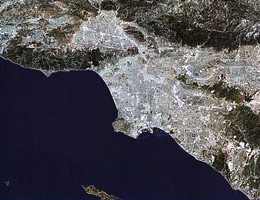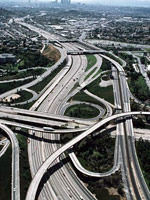Postmetropolis
Postmetropolis is an ambitious term that could be summarized as the "postmodern metropolis." With it Edward W. Soja aims to define the globalized city that he supposes to be involved in a radical transition process that began in the modern city, the fruit of the third urban revolution, and leads to the postmetropolis, the fruit of the late capitalist economic restructuring and its fourth urban revolution.

One of the main characteristics of the postmetropolis is its formal complexity. In it simultaneous deterritorialization and reterritorialization processes converge, i.e. processes of the disassembly of pre-existing urban realities and the recolonization of the city with new ones. The first are characterized by the weakening of the idea of place and of the territorially defined social communities, and the second by the appearance of a new spatiality where what is urban is inseparable from what is non-urban, where the limits between the interior and the exterior have become blurred, where concepts such as "city," "suburb," "country," and "metropolitan area" are hard to separate.
 Soja develops the term postmetropolis by following six discourses that refer to socioeconomic phenomena that come together in the postmodern metropolis: the discourse of economic restructuring, where the postmetropolis is presented as a production space, the threads of which penetrate each of the fibers of the city; the discourse of the globalization of capital, work, and culture, where the postmetropolis appears as an extremely heterogeneous cosmopolis; the discourse of the restructuring of urban space, where the postmetropolis undergoes combined processes of decentralization and centralization; the social discourse, where the postmetropolis is fractalized, fragmented, and polarized; and to end two final discourses that project this reflection on what Soja considers to be the postmetropolis par excellence: Los Angeles.
Soja develops the term postmetropolis by following six discourses that refer to socioeconomic phenomena that come together in the postmodern metropolis: the discourse of economic restructuring, where the postmetropolis is presented as a production space, the threads of which penetrate each of the fibers of the city; the discourse of the globalization of capital, work, and culture, where the postmetropolis appears as an extremely heterogeneous cosmopolis; the discourse of the restructuring of urban space, where the postmetropolis undergoes combined processes of decentralization and centralization; the social discourse, where the postmetropolis is fractalized, fragmented, and polarized; and to end two final discourses that project this reflection on what Soja considers to be the postmetropolis par excellence: Los Angeles.
Authors
Edward W. Soja is an urban geographer and a teacher at the Department of Urban Planning of the University of California–Los Angeles (UCLA). He approaches the contemporary city from a typically Anglo-Saxon and North American viewpoint. The center of all his analyses is the urban area of Los Angeles, which he has studied from very varied perspectives: Urban criticism, the political economy, regional planning, urban geography... His studies concentrate on the spatiality of social relations, focussing on matters of class, race, gender, identity, and in particular the impact of the late capitalist economic restructuring. He belongs to the so-called LA School, a group of neo-Marxist researchers from the departments of Urban Planning and Geography at UCLA who carry out regional studies and produce urban criticism.
Bibliography
- SOJA, Edward W. Postmodern geographies. The reassertion of space in critical social theory. London: Verso Press, 1989.
- SOJA, Edward W. Thirdspace. Journeys to Los Angeles and other real and imagined places. Oxford: Blackwell Publishers, 1996.
- SOJA, Edward W. Postmetropolis. Critical studies of cities and regions. Oxford: Blackwell Publishers, 2000.
Links
- ParoleDictionary on the contemporary city
- UrbanwordsUrban Planning dictionary
- Biblio 3WUniversitat de Barcelona's online magazine